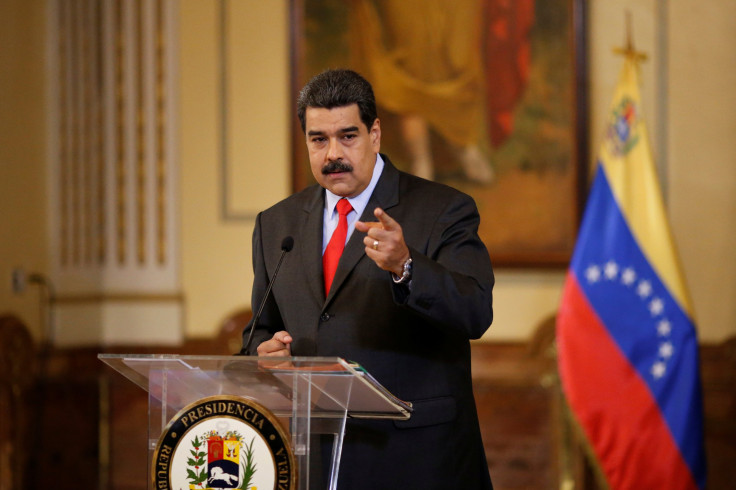Venezuela President Nicolás Maduro Asks Trump For ‘Time And Place’ For Dialogue

Venezuela's President Nicolás Maduro urged President Donald Trump to change his agenda of aggression and asked him to fulfill his campaign promise of “non-interference.” Taking to Twitter, Maduro wrote: “@RealDonaldTrump campaigned promoting non-interference in the internal affairs of other countries. The time has come to fulfill it and change your agenda of aggression for one of dialogue. Dialogue in Caracas or Washington DC? Time and place and there I will be.”
.@RealDonaldTrump hizo campaña promoviendo la no intromisión en los asuntos internos de otros países. Llegó el momento de cumplirlo y cambiar su agenda de agresión por una de diálogo. ¿Diálogo en Caracas o Washington DC? Hora y lugar y ahí estaré.
— Nicolás Maduro (@NicolasMaduro) February 19, 2018
The tweet comes as an aftermath of United States Admiral Kurt Tidd’s visit to Tumaco, Colombia, on Feb. 11. Tidd, the head of the U.S. Southern Command, was on an official visit which Colombian Vice President Oscar Naranjo’s office said was to review efforts to stop the flow of drugs from the country’s Pacific coast and “counter security threats.”
The visit came after Trump stressed in August 2017 he would not rule out “a possible military option” in Venezuela. Colombia and Venezuela have long had a strained relationship.
In response to Tidd’s visit, Venezuela’s chief prosecutor Tarek William Saab said: “In Colombia, they are planning to revive eras that had ended in human history, like military bombing, a military invasion or the occupation, through blood and gunfire, of a peaceful country like Venezuela. … We will not allow it. … What did the people of Venezuela do to deserve to be bombed, like the president of the United States threatened?”
However, some experts are of the belief that Tidd’s military visit to Colombia was merely part of a longstanding relationship between the countries.
Eric Farnsworth, vice president of the Council of Americas, a New York-based organization that promotes free trade, open markets and democracy among countries in the western hemisphere, told Newsweek: "The regime is desperate to portray themselves as the victim. … During a moment of economic peril in Venezuela, this is very convenient for [the Maduro regime] to try to find a foil in a visit of a U.S. military leader in Colombia.”
This is not the first time Maduro has asked for holding talks with Trump. In August 2017, after Trump made the “military option” comment, the Venezuelan president rang him up, but POTUS refused to take the phone call.
A White House statement then said: “Today, Nicolas Maduro requested a phone call with President Donald J. Trump. Since the start of this Administration, President Trump has asked that Maduro respect Venezuela’s constitution, hold free and fair elections, release political prisoners, cease all human rights violations, and stop oppressing Venezuela’s great people. The Maduro regime has refused to heed this call. … President Trump will gladly speak with the leader of Venezuela as soon as democracy is restored in that country."
Earlier this month, Secretary of State Rex Tillerson said the U.S. was considering raising the pressure on Maduro to restore the country’s constitution and hold fair elections.
Tillerson, in a speech ahead of his five-nation Latin American tour, said: “We have not advocated for regime change or removal of President Maduro. We have advocated that they return to the constitution.”
Two days later, he told reporters in Argentina: “Obviously sanctioning the oil, or in effect prohibiting the oil to be sold in the United States... is something we continue to consider.”
The restrictions on imports and exports of Venezuela’s oil and oil products would lead to an increase in financial pressure on the country, since it is already facing shortages of food and medicine.
"The situation is becoming quite dire in Venezuela. … Because not doing anything to bring this to an end is also asking the Venezuelan people to suffer for a much longer time," Tillerson added.
© Copyright IBTimes 2025. All rights reserved.





















